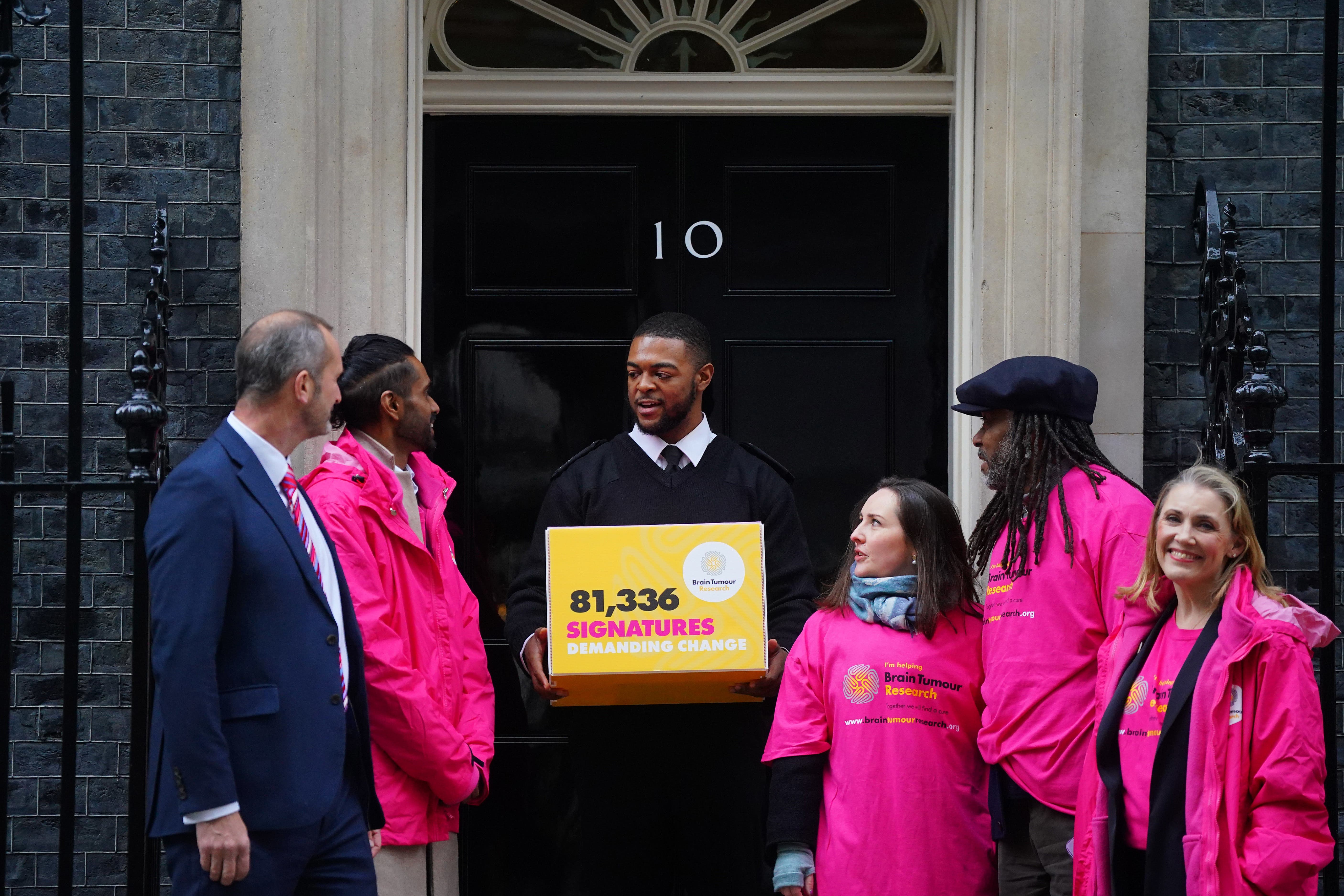Grieving families demand increased investment and research for brain cancer
Campaigners have handed in a petition signed by more than 80,000 people to Downing Street.

Your support helps us to tell the story
From reproductive rights to climate change to Big Tech, The Independent is on the ground when the story is developing. Whether it's investigating the financials of Elon Musk's pro-Trump PAC or producing our latest documentary, 'The A Word', which shines a light on the American women fighting for reproductive rights, we know how important it is to parse out the facts from the messaging.
At such a critical moment in US history, we need reporters on the ground. Your donation allows us to keep sending journalists to speak to both sides of the story.
The Independent is trusted by Americans across the entire political spectrum. And unlike many other quality news outlets, we choose not to lock Americans out of our reporting and analysis with paywalls. We believe quality journalism should be available to everyone, paid for by those who can afford it.
Your support makes all the difference.Grieving families and patients have demanded that ministers do more to tackle the burden of brain tumours.
Campaigners have handed in petition signed by more than 80,000 people to Downing Street calling for more investment and research into brain cancer.
Antiques Roadshow expert Theo Burrell, who was diagnosed with a glioblastoma (GBM) in June 2022, and Danny Clarke from the BBC’s The Instant Gardener, whose sister Margot McLellan died from GBM, joined Brain Tumour Research officials to hand in the petition.
Ms Burrell told the PA news agency: “Brain tumours are heavily underfunded, they need more investment, and we need to raise more awareness so that we can improve treatment options and ultimately find a cure.
“We’ve seen in other cancers, where more investment is put forward, better results – like leukaemia and breast cancer.
“So we need to bring brain tumours up to speed with those other types of cancers.”
Mr Clarke said: “I never really paid much attention to the disease before because it never affected me in any way, so (my sister’s diagnosis) was my first experience of it.
“And it just brought to light what a terrible illness it really is.”
Dan Knowles, chief executive of Brain Tumour Research, told PA: “We’re calling on the Government to make a step change in investment in research into brain tumours in the UK, so that we can find a cure for this devastating disease.
“Brain tumours kill more people under the age of 40 in the UK than any other type of cancer
“If you get diagnosed with a malignant brain tumour, you’ve got less than 50% chance of making it beyond one year.
“We’re here to try and find a cure for this disease and find the investment that’s needed so that we can do the research so we can change people’s lives.”
They were joined by Nicola Nuttall, from Barrowford, Lancashire, whose daughter Laura was just 23 when she died in May last year.
“Laura was passionate about raising awareness and finding a cure,” she said.
“It broke her heart every time she heard of another young person diagnosed with a brain tumour.
“It’s eight months since we lost our beautiful daughter, we miss her every minute of every day but I know campaigning for change is what she wanted us to do, so that in the future other families don’t have to endure the same devastation that we have.”
A Department of Health and Social Care spokesperson said: “Brain cancer is a devastating disease, which is why we’ve made £40 million available for research projects specifically looking for new treatments and therapies to tackle this illness.
“We’re investing in research infrastructure, workshops and training for clinicians to further progress developments in this field. And we continue to encourage further applications for research funding from successful candidates through the National Institute for Health and Care Research.”
It comes as the #CatchUpWithCancer campaign group performed a demonstration outside Parliament to highlight that tens of thousands of people have missed out on the 62-day cancer treatment target.
Oncologist Professor Pat Price, co-founder of the campaign group, said: “Let this be the end of accepting the unacceptable when it comes to cancer.
“We’re calling on all (political) parties to acknowledge the cancer crisis and commit to delivering a plan to tackle it.”
An NHS England spokesperson said: “The NHS has treated over 1.2 million people for cancer since 2020, and in the last year alone almost three million people received potentially lifesaving cancer checks and over 336,000 people started treatment – with over 90% of patients starting treatment within a month, despite record demand.
“NHS staff continue to work hard to prioritise the longest waiters and most urgent cases, and recent efforts mean more people are being diagnosed at an early stage than ever before and survival rates are higher than ever.
“It is vital people continue to come forward if they are concerned about symptoms – getting checked saves lives.”